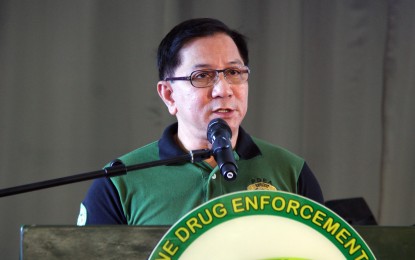
PDEA Director General Aaron Aquino. (File photo)
MANILA -- The Philippine Drug Enforcement Agency (PDEA) on Friday welcomed a Manila court's decision which ordered the forfeiture of over PHP23 million worth of proceeds from drug trafficking.
“The decision of the Regional Trial Court in Manila promulgated on August 30, 2019 granting the petition for civil forfeiture filed by the Anti-Money Laundering Council, through the Office of the Solicitor General, over the PHP23 million drug proceeds is another remarkable success of the government’s campaign against dangerous drugs,” PDEA Director General Aaron Aquino told Philippine News Agency (PNA) when sought for a comment.
Aquino said the ruling boosts the government's campaign against illegal drugs.
“Truly, to make our campaign against illegal drugs more effective, we need to confiscate and eventually forfeit the proceeds of the dangerous drugs from those involved in this illegal trade. The PDEA, through its Legal and Prosecution Service, is now doing its best to forfeit all the proceeds and instruments of unlawful acts of those convicted for violation of RA 9165 pursuant to Section 20 thereof,” he stressed.
Aquino said they were able to achieve success on the petition for civil forfeiture because of the strong working relationship between the PDEA and AMLC.
In March, the two agencies forged a partnership through a Memorandum of Understanding which paved the way for the conduct of joint regular workshops, meetings and case conferences.
“Presently, we are finalizing another Memorandum of Agreement between the PDEA and the AMLC specifically on the civil forfeiture and criminal forfeiture of the proceeds of the dangerous drugs,” said Aquino.
Aquino said through all the legal remedies stated in Republic Act (RA) 9160 or the Anti Money Laundering Act of 2001 and RA 9165 or the Comprehensive Dangerous Drugs Act of 2002 specifically on the civil and criminal forfeitures, criminals are deprived of the proceeds of their criminal activities and will lessen their capacity to continue with their drug activities.
On September 18, 2014, the PDEA- Region 1 (RO1) implemented a search warrant at the residence of Genaro A. Taliño in Barangay Becques in Tagudin, Ilocos Sur where operatives found bags of shabu and six bank deposit slips.
The PDEA-RO1 referred the deposit slips to the AMLC for financial investigation, and upon inquiry on the basis of Resolution No. 29-A dated 27 May 2015, the AMLC filed, through the Office of the Solicitor General (OSG), a Petition for Civil Forfeiture before the RTC in Manila. The petition covered the said accounts, including 11 other related accounts.
The RTC, in turn, granted the petition and made permanent the Asset Preservation Order (APO) on January 18, 2016.
The court also directed the forfeiture in favor of the government and placed under the authority and disposal of the AMLC, 15 bank accounts with balances amounting to over PhP23 million.
As of 2018, the AMLC has turned over almost PHP49 million cash and seven hectares of land, estimated to be worth PHP10 million, to the Bureau of Treasury. The recent RTC decision now brings AMLC’s total turnover to over PhP82 million worth of assets.
The AMLC investigates suspicious transactions, covered transactions deemed suspicious, money laundering (ML) and terrorism financing (TF) activities, and violations of the Anti-Money Laundering Act of 2001 (AMLA), as amended and the Terrorism Financing Prevention and Suppression Act of 2012 (TFPSA). The AMLC also gathers evidence to establish probable cause required in the filing of applications for bank inquiry, petitions for freeze orders, civil forfeiture cases, and criminal complaints for ML.
In 2018, the AMLC adopted an asset preservation system on the management and preservation of assets and properties that are subject to asset preservation order and judgment of forfeiture.
This allows the AMLC to ensure that during the pendency of cases and after their forfeiture, the assets do not diminish in value, including perishable assets converted into cash before remittance to the National Treasury or, in appropriate cases, to the requesting State.
Through timely use of provisional and confiscation measures, criminals are deprived of the proceeds and instrumentalities of their illegal activities. Ultimately, this makes lawlessness unprofitable and reduces both predicate crimes and ML. (PNA)
